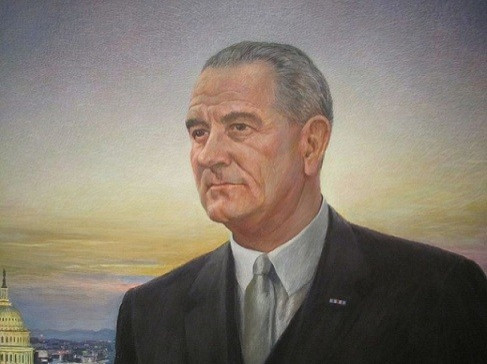Lyndon B. Johnson: The Greatest Texan
column

A Texan has pulled out of the 2012 Republican Party nomination race for U.S. president, but once there was a Texan who did not back away from anything. That is, at least not until the sunset of his political life.
He was a giant among lawmakers, a giant among Texans, and most certainly a giant among Americans.
His name was Lyndon B. Johnson, the 36th president of the United States, 1963-1969, and, arguably, the nation's greatest social reformer since President Franklin D. Roosevelt, 1933-1945.
The Great Society
Known as LBJ, Johnson's crowning achievements were the Great Society, and his support for two major pieces of legislation in the civil rights movement -- the U.S. Civil Rights Act of 1964 and the U.S. Voting Rights Act of 1965.
The Great Society's goal was to eliminate poverty and address the inadequacy of health care among senior citizens and the poor. Some anti-poverty programs and urban renewal programs did not work, but many did. Further, Medicare, the senior citizen health care program, has become one key cornerstone in the U.S.'s social safety net (another cornerstone being Social Security). In fact, Medicare is so popular it's part of the legendary third rail of Washington politics: touch that third rail, and bad things happen to your political career.
Also, while Medicaid, the health care system for the poor, has faced greater opposition in recent decades than Medicare, Medicaid nonetheless enjoys better-than-adequate support and does a very good job providing at least modest health care to the poor: many low-income Americans would not have their ailments addressed without it.
Another Johnson landmark achievement? The U.S. Higher Education Act of 1965. Often overlooked, this act dramatically increased federal funds to universities, created scholarships and low-interest loans for students, and started the federal financial aid program -- a standardized, national system of determining student aid / loan eligibility. Simply, LBJ's higher education act enabled tens of millions of Americans to obtain a college education -- increasing the incomes of these Americans and broadening the nation's skill set -- enabling more adults to fully participate in American society. It is not an overstatement to say Johnson's higher education act gave these Americans a better chance to achieve the American dream.
Moreover, Johnson's interest in education was not an idle passing, or something that was merely grafted late on to his legislative program. Far from it: the importance of education in reducing poverty and the ills that ignorance triggers was seared into him during his early adult years spent teaching mostly Mexican children at the Welhausen School in Cotulla, Texas in the late 1920s.
I shall never forget the faces of the boys and the girls in that little Welhausen Mexican School, and I remember even yet the pain of realizing and knowing then that college was closed to practically every one of those children because they were too poor. And I think it was then that I made up my mind that this nation could never rest while the door to knowledge remained closed to any American, - President Lyndon Johnson, Southwest Texas State College speech, 1965.
LBJ's Mistake: Vietnam War Escalation
LBJ's albatross? It was, of course, his inability to withdraw U.S. Armed Forces from South Vietnam amid its war with communist North Vietnam. In fairness to Johnson, he would have faced an enormous amount of criticism and probably would have been viewed as someone who gave-in to the communists had he withdrawn in 1964 or 1965. But LBJ's policy, a dramatic escalation of a land war in Southeast Asia -- something even the hawkish U.S. General Douglas MacArthur earlier had warned against -- triggered even bigger problems: an unwinnable war in Vietnam, 58,220 Americans killed, 303,635 wounded, and massive social unrest at home -- social unrest and public disapproval that grew so large that in 1968, Johnson chose to not seek another term as president.
His 1968 Democratic Party nomination process decline speech was the only time Lyndon B. Johnson pulled out of anything. Even so, Lyndon Johnson's legacy as a social reformer who helped tens of millions of Americans live dignified, fuller lives remains intact.
--
© Copyright IBTimes 2025. All rights reserved.





















